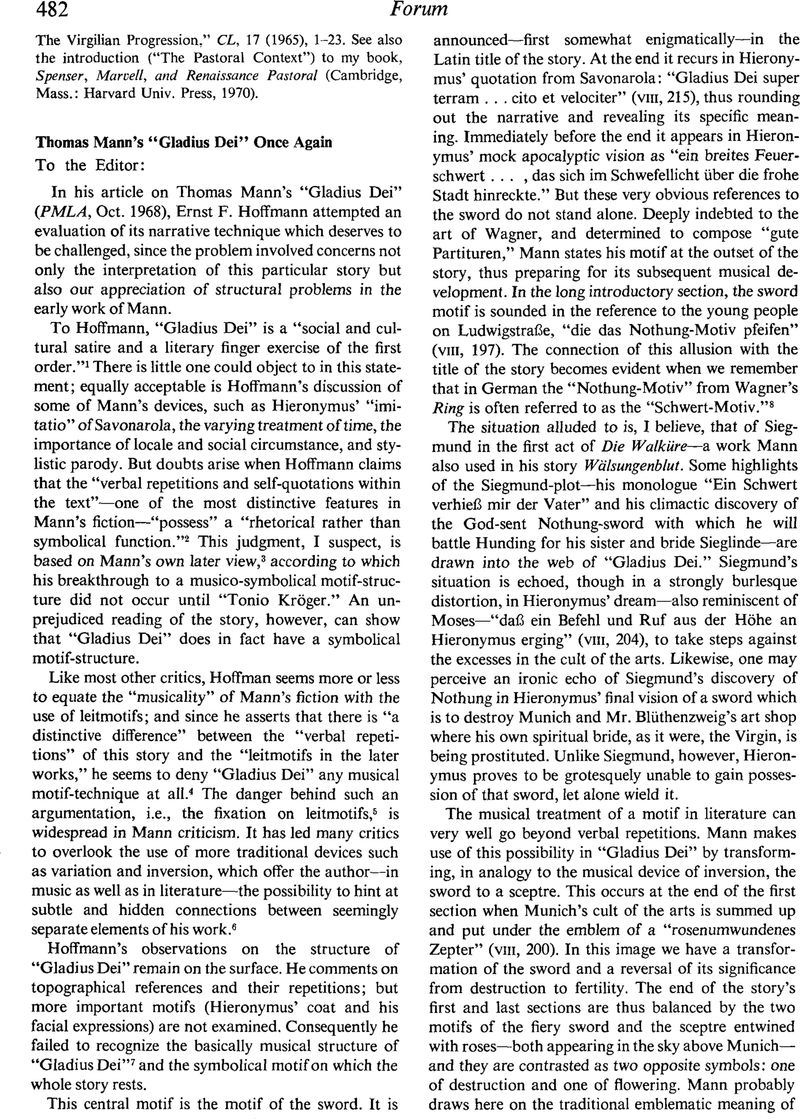No CrossRef data available.
Article contents
Thomas Mann's Gladius Dei Once Again
Published online by Cambridge University Press: 01 December 2020
Abstract

- Type
- Letter
- Information
- Copyright
- Copyright © Modern Language Association of America, 1971
References
Notes
1 Ernst Fedor Hoffmann, “Thomas Mann's ‘Gladius Dei,‘ ” PMLA, 83 (1968), 1360.
2 In a similar vein Hoffmann writes: “The recurrences in ‘Gladius Dei’ . . . only assure that the essentially fictional event of the last part does not become independent of the pointedly topical beginning and thus they secure the ties of the story to a specific time and place in reality. Nor does the repetition of words or phrases when used to identify characters in ‘Gladius Dei’ carry the weight of accumulative knowledge which may evolve into a symbol as it does, for instance, in ‘Tonio Kroger’ or again in Zauberberg” (pp. 1360–61).
3 “LebensabriC,” in Thomas Mann, Gesammelte Werke (Frankfurt: S. Fischer Verlag, 1960), xi, 115–16. Subsequent references are to this edition.
4 P. 1361.
5 We are still far from a clarification of the relationship between Mann's fiction and Wagner's music. For an intelligent review of the problem of the leitmotif see Ch. i (“Die Theorie des Leitmotivs”) of Francis Bulhof, Trans-personalismus und Synchronizitdt. Wiedkerholung als Struk-turelement in Thomas Manns “Zauberberg” (Groningen: van Denderen, 1966), pp. 7–28. See also: Victor Zmegac, Die Musik im Schaffen Thomas Manns (Zagreb: Vjesnik Pogon Tipografija, 1959), pp. 40–45, 86–98; Steven P. Scher, “Thomas Mann's ‘Verbal Score,‘ ” in Scher, Verbal Music in German Literature (New Haven: Yale Univ. Press, 1968), pp. 106–54.
6 See Hans Mayer's remarks on the close relationship in Wagner's Ring between the motif of the sword and that of Wotan's spear, in Anmerkungen zu Richard Wagner (Frankfurt: Suhr Kamp Verlag, 1966), p. 102.
7 This musical quality was clearly felt by Howard Nemerov when he wrote that “Gladius Dei” “anticipates a kind of musical composition ... in which, as Leverkuhn says, ‘there shall be nothing unthematic.‘ ” “Themes and Methods: The Early Stories of Thomas Mann,” Carleton Miscellany, 2 (1961), 11.
8 See Mann's revealing confession about the impact on him of Wagner's sword motif in Betrachtungen eines Un-politischen, xii, 80–82.
9 Hoffmann, admittedly, arrives at a similar interpretation (p. 1359). His method, however, is more intuitive, and he fails to show the objective correlative of Mann's cultural criticism in the musico-symbolical structure of the story.
10 “Der französische Einflu$sZ,” x, 838.




